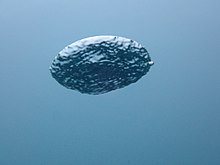What does physical entity mean?
Definitions for physical entity
phys·i·cal enti·ty
This dictionary definitions page includes all the possible meanings, example usage and translations of the word physical entity.
Princeton's WordNet
physical entitynoun
an entity that has physical existence
Wikipedia
physical entity
In common usage and classical mechanics, a physical object or physical body (or simply an object or body) is a collection of matter within a defined contiguous boundary in three-dimensional space. The boundary must be defined and identified by the properties of the material. The boundary may change over time. The boundary is usually the visible or tangible surface of the object. The matter in the object is constrained (to a greater or lesser degree) to move as one object. The boundary may move in space relative to other objects that it is not attached to (through translation and rotation). An object's boundary may also deform and change over time in other ways. Also in common usage, an object is not constrained to consist of the same collection of matter. Atoms or parts of an object may change over time. An object usually meant to be defined by the simplest representation of the boundary consistent with the observations. However the laws of physics only apply directly to objects that consist of the same collection of matter. In physics, an object is an identifiable collection of matter, which may be constrained by an identifiable boundary, and may move as a unit by translation or rotation, in 3-dimensional space. Each object has a unique identity, independent of any other properties. Two objects may be identical, in all properties except position, but still remain distinguishable. In most cases the boundaries of two objects may not overlap at any point in time. The property of identity allows objects to be counted. Examples of models of physical bodies include, but are not limited to a particle, several interacting smaller bodies (particulate or otherwise), and continuous media. The common conception of physical objects includes that they have extension in the physical world, although there do exist theories of quantum physics and cosmology which arguably challenge this. In modern physics, "extension" is understood in terms of the spacetime: roughly speaking, it means that for a given moment of time the body has some location in the space (although not necessarily amounting to the abstraction of a point in space and time. A physical body as a whole is assumed to have such quantitative properties as mass, momentum, electric charge, other conserved quantities, and possibly other quantities. An object with known composition and described in an adequate physical theory is an example of physical system.
ChatGPT
physical entity
A physical entity typically refers to anything that exists and interacts with the physical universe, including objects, substances, phenomena, processes or a combination of these that have attributes such as weight, volume, location, shape, or anything observable or measurable. These can include tangible entities like humans, animals, plants, rocks, buildings, planets, as well as intangible ones like light, sound, gravity or magnetic fields, as long as they have physical properties.
Numerology
Chaldean Numerology
The numerical value of physical entity in Chaldean Numerology is: 9
Pythagorean Numerology
The numerical value of physical entity in Pythagorean Numerology is: 6
Translation
Find a translation for the physical entity definition in other languages:
Select another language:
- - Select -
- 简体中文 (Chinese - Simplified)
- 繁體中文 (Chinese - Traditional)
- Español (Spanish)
- Esperanto (Esperanto)
- 日本語 (Japanese)
- Português (Portuguese)
- Deutsch (German)
- العربية (Arabic)
- Français (French)
- Русский (Russian)
- ಕನ್ನಡ (Kannada)
- 한국어 (Korean)
- עברית (Hebrew)
- Gaeilge (Irish)
- Українська (Ukrainian)
- اردو (Urdu)
- Magyar (Hungarian)
- मानक हिन्दी (Hindi)
- Indonesia (Indonesian)
- Italiano (Italian)
- தமிழ் (Tamil)
- Türkçe (Turkish)
- తెలుగు (Telugu)
- ภาษาไทย (Thai)
- Tiếng Việt (Vietnamese)
- Čeština (Czech)
- Polski (Polish)
- Bahasa Indonesia (Indonesian)
- Românește (Romanian)
- Nederlands (Dutch)
- Ελληνικά (Greek)
- Latinum (Latin)
- Svenska (Swedish)
- Dansk (Danish)
- Suomi (Finnish)
- فارسی (Persian)
- ייִדיש (Yiddish)
- հայերեն (Armenian)
- Norsk (Norwegian)
- English (English)
Word of the Day
Would you like us to send you a FREE new word definition delivered to your inbox daily?
Citation
Use the citation below to add this definition to your bibliography:
Style:MLAChicagoAPA
"physical entity." Definitions.net. STANDS4 LLC, 2024. Web. 23 Apr. 2024. <https://www.definitions.net/definition/physical+entity>.



Discuss these physical entity definitions with the community:
Report Comment
We're doing our best to make sure our content is useful, accurate and safe.
If by any chance you spot an inappropriate comment while navigating through our website please use this form to let us know, and we'll take care of it shortly.
Attachment
You need to be logged in to favorite.
Log In